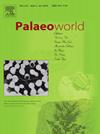Freshwater microconchids from the Tanzhuang Formation (Middle-Late Triassic) in North China
IF 1.7
3区 地球科学
Q2 PALEONTOLOGY
引用次数: 0
Abstract
We describe aggregative microconchid tubes from Middle-Late Triassic lacustrine strata of the Tanzhuang Formation in the Jiyuan-Yima Basin, North China. These microconchid tubes are attached to plant fragments and are preserved with bivalves, ostracodes, phyllostachys, gastropods, and coleoptera fragments. The findings confirm that the extinct lophophorate group inhabited non-marine continental basins. Microconchids dispersed extensively in continental basins and became common in lacustrine strata during Middle-Late Triassic. Its expansion may have been promoted by the recovery of the land ecosystem in the aftermath of the end-Permian crisis.
华北唐庄地层(中晚三叠世)的淡水微壳类群
我们描述了华北济源-义马盆地唐庄地层中-晚三叠世湖相地层中的聚合微孔管。这些微孔管附着在植物碎片上,并与双壳类动物、奥陶纲动物、植食类动物、腹足类动物和鞘翅目动物碎片一起保存。这些发现证实,已灭绝的嗜水鸟类栖息在非海洋性的大陆盆地中。微孔类广泛分布于大陆盆地,在三叠纪中-晚期成为湖相地层中的常见类群。二叠纪末危机后陆地生态系统的恢复可能促进了该类群的扩展。
本文章由计算机程序翻译,如有差异,请以英文原文为准。
求助全文
约1分钟内获得全文
求助全文
来源期刊

Palaeoworld
PALEONTOLOGY-
CiteScore
4.00
自引率
5.90%
发文量
95
期刊介绍:
Palaeoworld is a peer-reviewed quarterly journal dedicated to the study of past life and its environment. We encourage submission of original manuscripts on all aspects of palaeontology and stratigraphy, comparisons of regional and global data in time and space, and results generated by interdisciplinary investigations in related fields. Some issues will be devoted entirely to a special theme whereas others will be composed of contributed articles. Palaeoworld is dedicated to serving a broad spectrum of geoscientists and palaeobiologists as well as serving as a resource for students in fields as diverse as palaeobiology, evolutionary biology, taxonomy and phylogeny, geobiology, historical geology, and palaeoenvironment.
Palaeoworld publishes original articles in the following areas:
•Phylogeny and taxonomic studies of all fossil groups
•Biostratigraphy, chemostratigraphy, chronostratigraphy
•Palaeoecology, palaeoenvironment and global changes throughout Earth history
•Tempo and mode of biological evolution
•Biological events in Earth history (e.g., extinctions, radiations)
•Ecosystem evolution
•Geobiology and molecular palaeobiology
•Palaeontological and stratigraphic methods
•Interdisciplinary studies focusing on fossils and strata
 求助内容:
求助内容: 应助结果提醒方式:
应助结果提醒方式:


